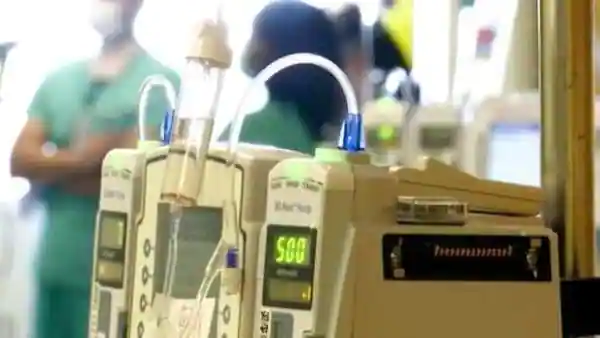
[ad_1]
While the figure remains below the country’s winter peak, hospitals in some parts of the US are straining under the load, and officials in states including Georgia, Kentucky, Tennessee and Idaho have requested extra personnel and resources.
The number of patients in hospital beds with confirmed and suspected Covid-19 cases hit 100,517 on Tuesday before falling slightly to 100,059 on Wednesday, according to the latest data posted by the U.S. Department of Health and Human Services. That is up from 53,529 on Aug. 1.
The last time hospitalizations neared those levels was in late January, at the end of a prolonged and deadly winter surge. At the peak, on Jan. 14, Covid-19 hospitalizations stood at 142,229.
The recent uptick, which follows a similar rise in newly reported coronavirus cases, is being fueled by the highly contagious Delta variant and lower-than-average vaccination rates in some states and regions. Just over 60% of the eligible U.S. population is fully vaccinated, according to the Centers for Disease Control and Prevention. The majority of recent Covid-19 related hospitalizations are among the unvaccinated, the CDC has said.
The Delta variant, which was first identified in India, became the dominant strain in the U.S. in early July. It pushed Covid-19 infections higher after a drop that followed the rollout of vaccines earlier in the year.
The seven-day average of new Covid-19 cases, which helps smooth out states’ irregular data-reporting schedules, topped 150,000 on Monday. At the start of the month, the number of new cases was averaging 79,942, according to CDC data.
Deaths, a lagging indicator, have also been edging higher in recent weeks. The number of daily deaths associated with Covid-19, based on a seven-day average, broke the 1,000 mark last Saturday, but remains well below the peak of 3,425 on Jan. 13.
As hospitalizations have climbed, adequate and qualified healthcare staffing has become an issue in some states.
Georgia Gov. Brian Kemp said Tuesday the state’s National Guard will deploy over 100 personnel to hospitals throughout the state. Georgia hospitals have more than 6,000 patients with suspected and confirmed Covid-19 cases, according to the latest HHS data, up from a low of 572 on June 20.
“These guardsmen will assist our front-line healthcare workers as they provide quality medical care,” Mr. Kemp said. Last week, the Republican said he would add $125 million to increase staff and hospital capacity due to a lack of qualified staff.
In Kentucky, where 65% of intensive-care unit beds are occupied, Gov. Andy Beshear asked the Federal Emergency Management Agency for additional healthcare support, including registered nurses and emergency medical-services teams.
“Our hospitals need this support, and we will do what it takes to make it happen,” the Democrat said Monday. Kentucky hospitals have more than 2,000 patients with suspected and confirmed Covid-19 cases, according to the latest HHS data, up from a recent low of 175 on June 27.
In neighboring Tennessee, where hospitalizations have risen from less than 800 a month ago to more than 2,500, the National Guard has increased its support after a request from the state’s Department of Health.
Idaho’s emergency management agency has also asked FEMA for assistance to help with staffing capacity shortages, according to the state’s request form. The news was earlier reported by the Idaho Capital Sun.
“The number of patients in the ICU with Covid-19 is now the highest it is ever been across the state at any point during the pandemic,” Idaho Health and Welfare Director Dave Jeppesen said Tuesday.
The latest data from HHS shows that Idaho hospitals have 457 patients with suspected and confirmed Covid-19 cases, up from 68 on June 15. Mr. Jeppesen said the vast majority of intensive-care patients were unvaccinated.
Never miss a story! Stay connected and informed with Mint.
Download
our App Now!!
[ad_2]